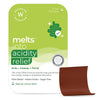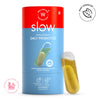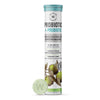If you’ve ever felt that annoying burning sensation in your chest after a spicy meal or a cup of coffee, you’re not alone. Acidity, also known as acid reflux, is one of the most common digestive complaints today. Whether it’s occasional discomfort or something you deal with regularly, finding the right solution is key.
Most of us are familiar with reaching for a quick medicine for acidity, like an over-the-counter antacid or acid reflux medicine when things get uncomfortable. But have you ever wondered if there's a better, more natural way to deal with it?
Let’s explore how modern medicine for acidity compares to natural remedies and what works best for acidity.
What Causes Acidity in the First Place?
Before diving into the remedies, it's helpful to understand what's actually going on. Acidity occurs when excess stomach acid flows back up into the esophagus, causing that burning feeling, bloating, burping, or even nausea. This can be triggered by:
-
Overeating
-
Spicy or greasy foods
-
Caffeine or alcohol
-
Stress
-
Irregular eating habits
-
Lack of physical activity
And, of course, certain underlying conditions like GERD (Gastroesophageal Reflux Disease) can also be to blame.
Modern Medicine for Acidity
When it comes to fast relief, modern medicine for acidity definitely has its place. Antacids, H2 blockers, and proton pump inhibitors (PPIs) are some of the most common acid reflux medicines. These work by either neutralizing stomach acid or reducing its production.
They provide fast, sometimes immediate, relief—which is why so many people rely on them. But here's the catch: they're more of a Band-Aid than a long-term fix.
Long-term or frequent use of these medicines can lead to side effects like:
-
Nutrient malabsorption (especially B12 and magnesium)
-
Constipation or diarrhea
-
Gut flora imbalance
-
Dependency or rebound acidity
So while they’re helpful in acute situations, using them as your primary or long-term medicine for acidity might not be ideal.
Ayurvedic or Natural Medicine for Acidity
Unlike allopathy, which aims to suppress stomach acid, Ayurvedic medicine for acidity focuses on balancing the body’s internal systems—especially the aggravated Pitta dosha, which is associated with heat, inflammation, and excess digestive fire.
Ayurveda treats acidity by cooling the digestive tract, improving digestive function, and reducing inflammation naturally. Here are some of the most powerful herbs and remedies used:
-
Licorice root (Mulethi): A soothing herb that helps form a protective layer in the stomach, reducing inflammation and promoting healing of the stomach lining.
-
Amla (Indian gooseberry): Rich in Vitamin C and antioxidants, Amla helps cool down the stomach and promotes better digestion without increasing acidity.
-
Fennel seeds (Saunf): Commonly used after meals, fennel helps reduce bloating, calms the digestive system, and reduces acid formation.
-
Cardamom (Elaichi): Known for its cooling effects, cardamom helps neutralize stomach acids and improves appetite.
-
Coriander seeds (Dhaniya): Often brewed into a tea or soaked overnight, these seeds help flush toxins and reduce acidity.
-
Clove (Laung): Stimulates salivary production, which aids in digestion and neutralizes excess acid in the stomach.
-
Ginger (Adrak): While warming in nature, when used correctly, ginger boosts digestion and prevents acid from flowing back up the esophagus.
-
Ajwain (Carom seeds): Highly effective for indigestion and flatulence, ajwain helps stimulate digestive enzymes and reduces acid build-up.
-
Triphala: A classic Ayurvedic blend of three fruits—Amalaki, Bibhitaki, and Haritaki—Triphala improves digestion, detoxifies the system, and regulates bowel movements, preventing acid reflux caused by constipation.
-
Basil (Tulsi): Known for its adaptogenic properties, Tulsi not only helps relieve stress (a common acidity trigger) but also soothes the stomach and reduces gas formation.
Many of these herbs are now available in modern supplement formats like effervescent tablets, melts, or plant-based capsules—combining ancient wisdom with modern convenience. They offer a gentle, long-term solution to acidity by addressing the root cause rather than simply masking the symptoms.
Natural Supplements
Today’s natural supplements for acidity often combine ancient herbs with modern science to deliver effective results. They’re crafted with ingredients like Amla, Licorice, Fennel, and Aloe Vera—some also include naturally alkalizing ingredients to neutralize acid in a gentler way. These plant-based formulas don’t just fight symptoms—they support digestion, soothe inflammation, and help the body maintain an acid-alkaline balance.
Another modern twist on natural gut support is probiotics.
Your gut houses trillions of bacteria, and keeping them balanced is crucial for proper digestion. Studies have shown that probiotics can help regulate stomach acid, reduce bloating, and even support better absorption of nutrients.
Probiotic and probiotic + prebiotic blend supplements help restore gut flora, enhance nutrient breakdown, and reduce occasional acidity—naturally.
Ayurveda vs Allopathy for Acidity
Let’s break it down:
|
Approach |
Strengths |
Limitations |
|
Allopathy (Modern Medicine) |
Fast relief, especially in emergencies |
May cause side effects, doesn't address the root cause |
|
Ayurveda/Natural Remedies |
Addresses root causes, long-term benefits, minimal side effects |
May take time to show results; needs consistency. - Long-term benefits |
|
Natural Supplements |
Supports gut health, improves digestion, reduces recurrence |
Consistent intake can improve gut health and prevent gastric issues - Long-term benefits |
Rather than choosing one over the other, the smartest approach may be synergy. In cases of severe or chronic reflux, it might be necessary to use conventional medicines—but coupling them with ayurvedic remedies for acidity, dietary changes, and probiotics or natural supplements can improve long-term outcomes significantly.
The Lifestyle Factor: Where the Real Magic Happens
No treatment—natural or modern—can truly work unless we fix the root causes through daily habits. Lifestyle plays a huge role in how your digestive system behaves.
Here’s what you can do:
-
Eat smaller, more frequent meals
-
Avoid lying down immediately after eating
-
Cut back on caffeine, spicy, and oily foods
-
Practice mindful eating—chew slowly
-
Add fiber and water to your daily routine
-
Prioritize sleep and manage stress
-
Include natural supplements that support digestion
Whether you’re dealing with frequent heartburn or occasional indigestion, consider integrating nature-backed supplements, clean eating, and mindful habits into your daily life. You’ll likely notice not just relief from acidity, but a healthier, more energized you overall.
Final Thoughts
Acidity doesn’t have to rule your life—or your diet. While medicine for heartburn might offer temporary ease, nurturing your gut with natural support and smarter habits can create lasting change.
So, next time your stomach flares up, think beyond the antacid. Your gut deserves better.
































 DOWNLOAD NOW
DOWNLOAD NOW
